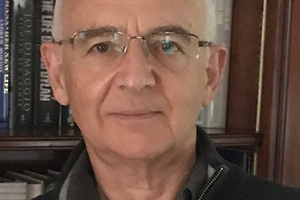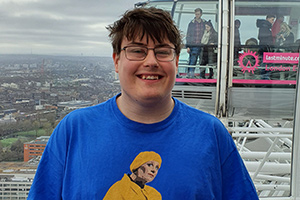David Renwick discusses Jonathan Creek, Rik Mayall, and more interview
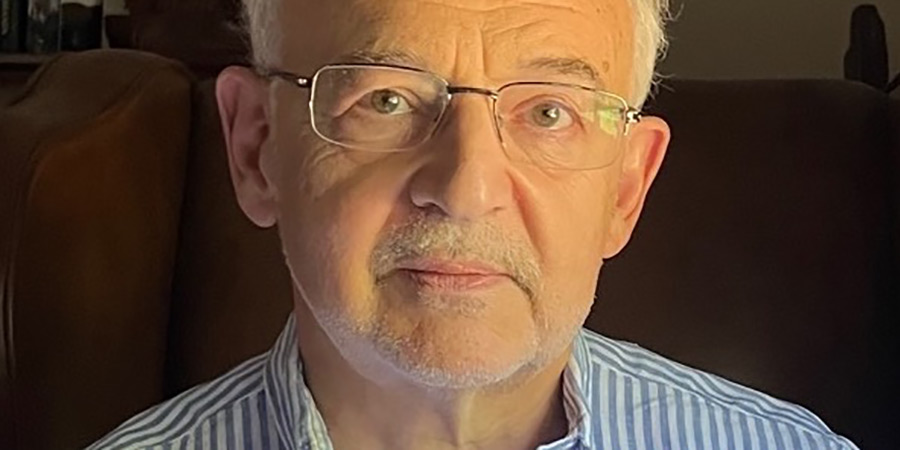
Following on from Part 1 of our interview with David Renwick, we talk to him here about the puzzling plots of Jonathan Creek, working with Rik Mayall and his lifelong friendship with David Jason.
Unusually, Jonathan Creek was made through the comedy department rather than drama, did that give you any more freedom?
I suppose it did in a way, because I'd built up by that time such a very solid relationship with the comedy department. And the whole reason it happened was because I and Susie Belbin, the producer and director of One Foot In The Grave, had this pipe-dream of creating a kind of British Columbo, which would work as an interesting detective series, full of intriguing clues and puzzles, but shored up by the same kind of laugh-out-loud comedy that we tried to achieve in One Foot In The Grave.
You often find that what can pass as "comedy drama" on television, is no more than slightly whimsical with a few witty remarks. And we both took the rather arrogant view that it was easier for us to weave in some serious drama to our comedy than for the Drama department to understand how comedy works. And so, yes, Jonathan Creek was always designed to be a Light Entertainment project, because we were nervous about how much the people in Drama might try to re-shape it into something that conformed more to their own ideals.
And in the end we seem to have achieved an absolutely perfect balance. The series was made very much with Drama's blessing, and I think a hefty slice of their money to help with the budget. We simply could never have made those hour-long shows at just twice the cost of a sitcom. But as far as I recall there was never the slightest suggestion of interference, and especially after the series became successful we were just left to our own devices.
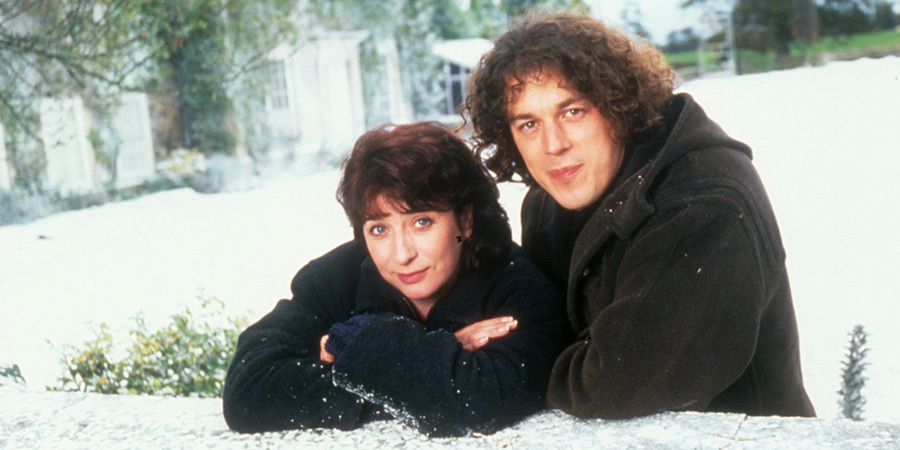
You had a very close working relationship with trailblazing producer Verity Lambert, through Jonathan Creek and later Love Soup. How did you feel when you first met and why do you think you worked so well together?
It's fair to say that I'd always had quite a chip on my shoulder about what one might ungenerously call the 'luvvie' world of Drama, and the somewhat elitist background that was so different to my own. Verity, by this stage of course, had produced many comedies as well as dramas, and was a legendary figure in the business, who I'd met only once, very briefly, in a drunken moment at the Bafta Awards. And when Geoffrey Perkins suggested I come in to talk to her about Jonathan Creek I was understandably nervous.
I don't think our first meeting was particularly auspicious. I would have been very much on the defensive, discussing my work with this incredibly posh, ex-Roedean executive who I was already convinced would have very little empathy for my style of writing. And I don't think there's any question that she detected that, and many years later admitted she felt she'd been handed a poisoned chalice. And yet being the dedicated professional she was, she made every effort to empathise, and couldn't have been more supportive of what we were trying to do.
And as time went on, we just got on like a house on fire, and contrary to all my worst misgivings she made no attempt to question or alter the shape of the show. I always said there was never anyone more appropriately named than Verity. When, let's be honest, the producer's job a lot of the time is to be a bit of a bullshitter, and tell each individual what you know they want to hear, she was always a hundred per cent straight with everyone, even when it wasn't particularly good news. That honesty was something I came to respect, because it meant you were never having to speculate or second guess her motives, and could just get on with dealing with whatever issue had come up. Verity was like that right across the board, not just with me but with the actors, the crew and everyone. And it became arguably the strongest relationship I ever had with a producer, through Jonathan Creek and then Love Soup. And obviously it was the most crushing tragedy that she left us when she did.
This isn't really comedy related but as we're talking about Verity, is it true that Steven Moffat once asked you to write an episode of Doctor Who, did you consider it?
I do have a recollection of this, but can't remember the specifics. I may well have been too busy, but I don't think I would have felt in any way qualified. Doctor Who is such a very different animal to something like Jonathan Creek. It wasn't a show I'd ever really followed, as science fiction has never been a genre that appealed to me. So I don't think it could have worked on any level. And best left to the people who know what they're doing.
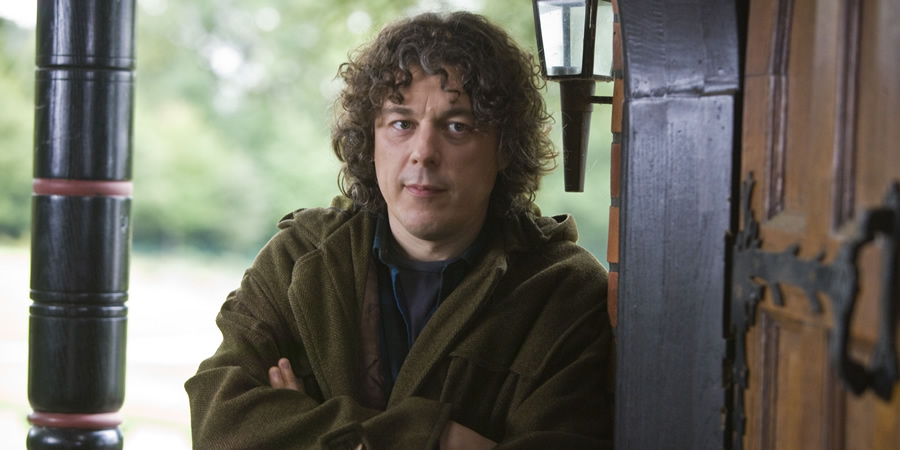
Your plots are so painstakingly constructed, the logic of the more surreal moments in One Foot, the crimes in Creek. Do you write treatments or plot it out on cue cards, or do you prefer to just begin writing?
My process I suppose, in that there's any process for writing when it's such a free association of ideas, in the case of One Foot it was always to just think of the funniest ideas or routines or moments, invariably unconnected, and then somehow try and weave them all together. If you were lucky they might, in themselves, suggest some kind of dramatic structure. Or else I'd come up with a separate, possibly non-comic, storyline, which was a lot easier, and then see if I could fit them into it.
With Creek I would start with the mystery, which of course was always hellishly difficult. And not until I'd got that under my belt could I begin to think of moving on to develop a plot that would accommodate that particular trick, and then, thirdly, the comic routines that might occur within it.
I remember once, in the days when I'd be invited to BBC junkets, running into Carla Lane at Wimbledon. She told me her approach to writing a new episode was that she would start with a random event, like an empty room with a phone ringing. Someone would come in and pick it up and a person on the line would say 'Hello, is Susan there?' And Carla would then think 'Who is that person on the phone? Who is Susan? And why does she want to speak to her...?' And she would take it all from there. It's safe to say her method couldn't have been more different from mine.
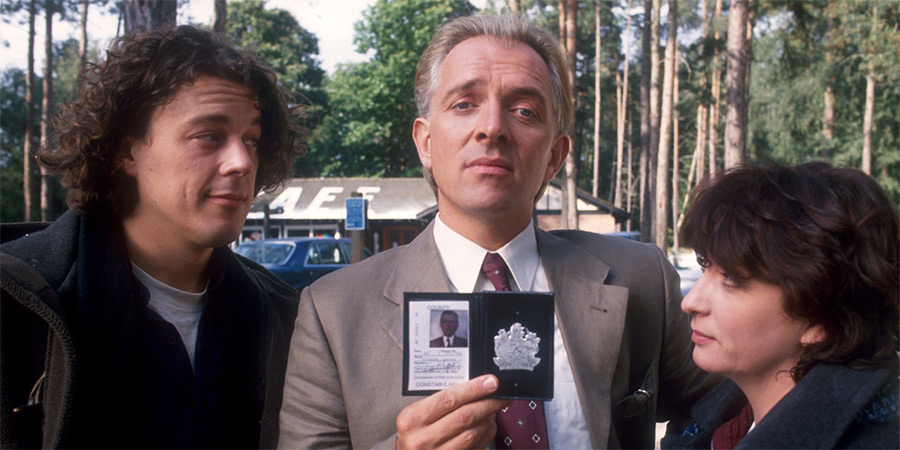
Black Canary is my favourite episode, which featured the great Rik Mayall. You first worked with him on Whoops Apocalypse. I understand he was once in the running to play Creek himself, had it always been an ambition to work with him?
Yes, well I first worked with him on the Whoops Apocalypse television series, he had a small part in that. When I was writing with Andrew Marshall, we'd always be trying to get him for something or other, because obviously he was one of the country's preeminent comic actors, and a hugely bankable commodity.
Paul Jackson approached us once in the eighties to say that Rik and Tracey Ullman were keen to work together, and we wrote a pilot for a series called Lunch, about the relationship between a comedy writer and his girlfriend, which I seem to remember almost got picked up until they found it was too expensive. He had a major cameo as the SAS commander in the film of Whoops Apocalypse, and some years later we worked together on a script for a Woody Allen-ish romantic comedy called Bayswater, which he was also keen to do, but this, too, sadly never came to fruition.
When Jonathan Creek came up and my first choice, Nicholas Lyndhurst, turned us down I think Rik was the next person we approached. As things turned out, he was, at that time, co-starring in Cell Mates, the Simon Gray play from which Stephen Fry famously disappeared. And Rik was too busy re-rehearsing, I think, to commit to us, but very generously said we should look elsewhere, and if we still drew a blank we could come back to him later on.
It's interesting, in retrospect, having seen him now twice in the show as Gideon Pryke, to imagine what he might have done with the main character [Rik reprised the role in the 2013 special Clue Of The Savant's Thumb, which also reunited him with The Young Ones co-star Nigel Planer]. He is of course nothing like Creek, and it is one of the great strengths of those episodes that you get such a contrast between the two of them, the tortoise and the hare.
Considering his various script characterisations over the years Rik often used to say that it needed more "swashbuckle!". That totally describes the kinds of characters he played, and of course Creek is the very antithesis of "swashbuckle". Even when I had him almost entirely paralysed in a wheelchair, Pryke behaves with the same kind of gung-ho gusto as before, and I think only Rik could have pulled that off.
When we made Black Canary, it was Rik's first acting job after his accident on the quad bike when he nearly died. So he was a bit dodgy on his lines, but made a special point of getting them fixed into his head, weeks before filming, so it wouldn't affect his performance.
Absolutely, you'd never know.
And he was just the most charming and funny man to work with, as I'm sure anyone will tell you.
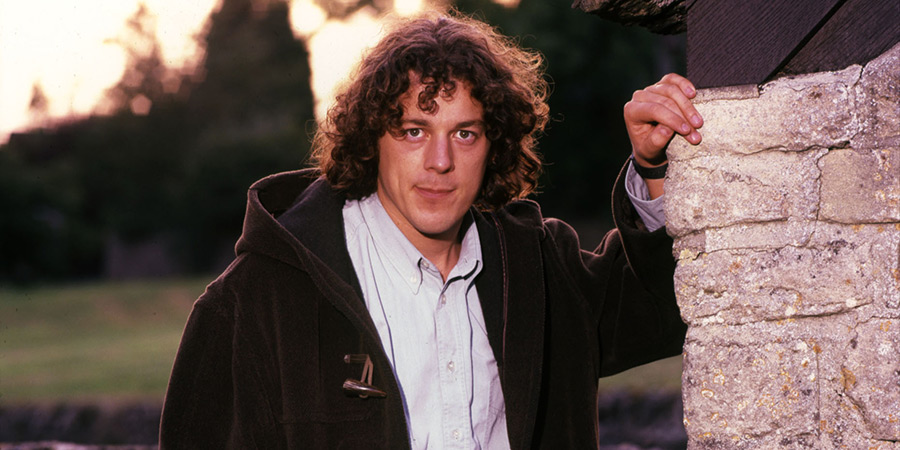
I understand there were two attempts to get an American version of Creek off the ground. How close did they come to happening?
There were several in fact, but none of them got very far. I think the first attempt was through Castle Rock, the company that made Seinfeld. Glenn Padnick, their chief executive, got a script deal with CBS, but I didn't feel any of the drafts they came up with worked particularly. And unsurprisingly CBS eventually passed on the project.
In 2002 Alan Davies had answered his phone one day, and it was Whoopi Goldberg on the line, saying she was a big fan of the show. I then got a message through my agent asking if I'd fly to New York to meet her. We had a nice breakfast at the Carlyle, and it turned out she used to watch all the shows with her granddaughter and try and work out the tricks.
She was keen to try and re-format the show for the US, and thought it would be fun for Creek to be living in a lighthouse, in Montauk or somewhere, at the far end of Long Island. She invited me to come up with a pilot script, and I wrote a part for her, as a guest detective, where the joke was that she was completely normal - no broken marriage or family problems, no history of alcohol or drug addiction, or rehab, or mental or physical tics, or any kind of "maverick" nature. Just a perfectly well-adjusted, straight, professional cop. I think it would have been quite a good fit for her, but as the months went by, I never heard another word.
Later on, Jane Tranter, who had moved on from the UK's Head of Drama to BBC America, tried to get a version off the ground with the writers of another CBS series, called Numbers. I believe they pitched it to every network in Hollywood, but once again it didn't happen.
Even more recently BBC America had another crack, and got as far as a deal with Netflix. This time it was being developed by John Rogers, a very good writer who I knew from the Cosby series. In this version Jonathan had become Verity Creek, who was gay and super-hip, and the emphasis here was concerned much more with human perception than the literal mechanics of a trick, and how the observer could be cleverly duped, using all sorts of neuro-scientific principles.
I read the first draft and said it just made me feel very old, as most things do these days, and just stepped back from it, thinking 'well let's just see where this goes, and whether anyone bites'. A long time passed, and you'll recognise the pattern now - eventually I got the call to say Netflix had decided to pass. No reasons given, or at least none that ever reached me. But of course this is just the norm in Hollywood. When something's actually picked up, as it was with One Foot and Cosby, it's a minor miracle. And I don't think that was ever going to happen twice in my life.
It's strange, because I've always thought that of my three solo projects - One Foot In The Grave, Jonathan Creek and Love Soup - it was Creek and Love Soup that were the strongest, original concepts. A magician's assistant who solves impossible crimes, and two people who are absolutely perfect soulmates but never meet, so you just see all their failed relationships - whereas One Foot In The Grave, there's no concept there at all. It's just someone I can throw into a lot of funny situations every week. How I managed to sell that as a format, for the money I did, is another matter. We all know it wouldn't have happened without Bill Cosby in the frame, but the irony is that after the first half dozen episodes the American version bore no resemblance to the one over here. I always said the only thing they kept was his cap.
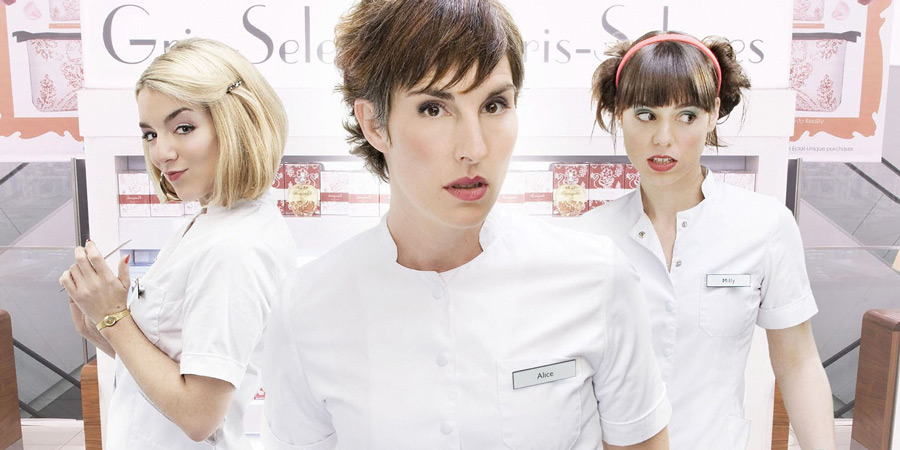
I suppose if you knew how to write a hit idea, you'd be writing them every week!
Exactly, it's all down to the development. When we were casting for One Foot, before the show had ever been aired, Susie and I would sit there interviewing all these actors, trying to explain what the premise was. We had this whole spiel about a man who's been forced to retire before his time, who finds all the little things in life suddenly get on his nerves ... and it just felt so pointless in the end, I'd just tell them "It's about this guy." What else did they need to know?
There's a long history, of course, of British sitcoms transferring to America ... Till Death Us Do Part, which became All In The Family...
Sanford And Son...
Yes, from Steptoe And Son, which were all set up by Beryl Vertue.
Another trailblazer of British television.
Absolutely, and also sadly no longer with us. Even shows like Man About The House and George & Mildred, which became very successful as Three's Company and The Ropers. But apart from The Office, that tradition seems to have petered out more these days.
You mentioned on the One Foot In The Grave Podcast you'd written a Jonathan Creek play. Can you tell us a bit about it and what stage it's at?
Well it's not anywhere really, it's not happening. I was approached by a production company about theatrical versions of One Foot In The Grave and Jonathan Creek, and after much reluctance ended up writing drafts of both. The One Foot play would have basically comprised favourite routines from the television series, reassembled. Jonathan Creek involved a brand-new story, with some comedy moments from the TV shows, but in a mostly theatrical setting.
My original instinct, if I were designing a Jonathan Creek for the stage, would have been some kind of very contained sealed room mystery, taking place in a single set, like The Mousetrap. But the producers were keen to exploit the element of live magic, which would obviously be far more impressive to an audience in the theatre, bearing in mind that on television you can just fake a lot of it, with camera tricks and cuts. So onstage, we'd have to recruit the services of a genuine illusionist or consultant to make it work.
So that seemed like a smart idea in principle, to go for the spectacle, though I immediately worried about the demands it would make on the budget. Initial reaction to both scripts was very positive, but as so often happens, once their suggested changes began to come in I got that horrible sinking feeling, that we really weren't on the same wavelength. And I know from experience the safest thing is to nip these things in the bud, because there are certain differences of approach that will never be resolved.
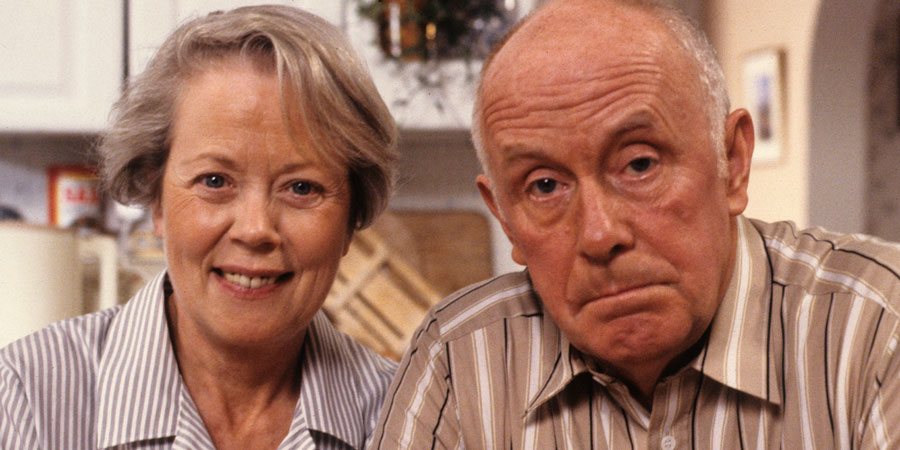
Another big problem with One Foot In The Grave was that we'd have had to recast the main characters. I know this has worked with some TV spinoffs - the Only Fools And Horses musical, for instance, I thought worked spectacularly well - but finding replacements for Richard and Annette, you just know, would have been next to impossible. With Jonathan Creek it would have been different, because the story involved the return of Maddy Magellan, twenty years on from when we last saw her, so the two of them would be the ages the actors are now.
It would have been quite a selling point. Alan and Caroline both read the script and were very keen to do it. Presumably in the form that I'd written. I don't think it's being too arrogant to think the three of us should know the best way to make our project work, and rather than corrupt the authenticity of the original I just decided it was best to pull the plug.
Of course the other factor was that I'd always had such an active, personal input in my work, to the point where I'd directed the last three Creek specials. But having essentially retired now, at the age of seventy, and with certain health issues compounded by the pandemic, I knew that I wouldn't have been able to devote all that time and energy into supporting the production. So that's something else that would have made me deeply uncomfortable.
I could talk about Jonathan Creek for hours, but we'd be here until Christmas. I love the film adaption of Wilt you and Andrew wrote in 1989. Did you chase that job as a fan of the books?
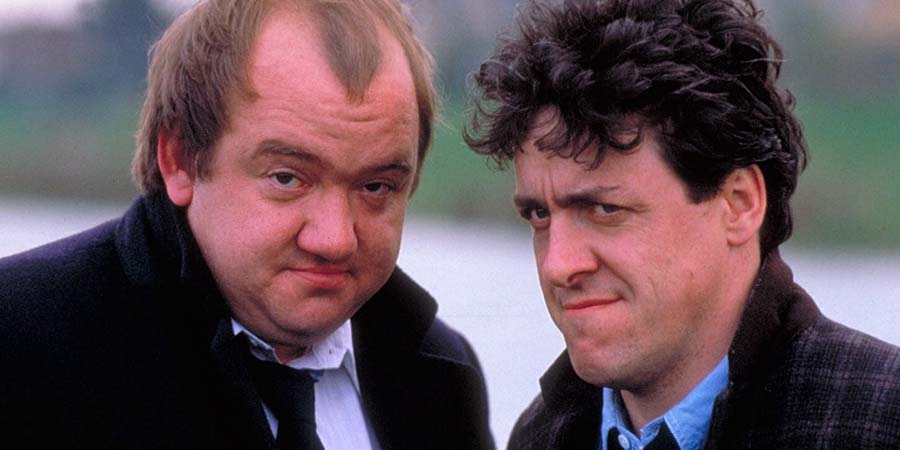
Not at all. The original adaptation was by Dick Clement and Ian La Frenais, and it was produced by Brian Eastman, who did Whoops Apocalypse. As I understood it, Mel Smith and Griff Rhys Jones, who were already lined up to play the main parts, weren't happy with the drafts that Dick and Ian had submitted, so Brian came to us to do some more work on them.
Andrew and I wrote a new prologue to the film and did quite a bit of work on the structure to beef up the comedy. But I think Dick and Ian, in the end, felt the result was too farcical and declined to have their names attached. And Andrew and I, just wanting to be scrupulously honest and not take sole credit, came up with the ambiguous wording "Screenplay adaptation", which strictly meant that we'd adapted Dick and Ian's screenplay. It should really have been a five-way writing credit with Tom Sharpe as well, or six if you include all the fiddles that Griff eventually added.
I'd like to mention what I believe is the last thing you and Andrew wrote together, If You See God, Tell Him. Where did that idea come from?
This was originally to have been our next project after Whoops Apocalypse and Hot Metal. Our producer Humphrey Barclay by this time had left LWT and the show was developed for Channel 4 through his own independent production company. After we'd got our knives into the press with Hot Metal we wanted to do the same with the advertising industry, which drove us both nuts, and still does to this day.
We spent a lot of time thinking about characters who worked in advertising, to satirise it from that direction, but nothing was ever coming together. And the breakthrough was deciding to look at it completely from the consumer's point of view. With this strange eccentric character, Uncle Godfrey, who'd suffered a brain injury and believed everything he saw in adverts. This seemed to make the point perfectly, if not very subtly, and I suppose it had literary antecedents in Candide, and arguably the Peter Sellers character Chance in Being There.
Seamus Cassidy at Channel 4 loved the scripts but, as so often happens, it failed to get off the ground and then just languished for four or five years. I think because I'd then had some success with One Foot In The Grave and Andrew with 2point4 Children, we had a bit more clout at the BBC when we submitted it to them. We did some rewrites, and Marcus Mortimer, who we'd worked with on Alexei Sayle's Stuff, produced and directed. With a sensational cast, headed by Richard Briers, Ade Edmondson and Imelda Staunton. There were only four episodes, and it's barely remembered today, but I think it's one of the best things we ever did together.
The last thing you wrote for BBC radio was Desolation Jests. You started your career writing sketches for David Jason before he was well known and ended your career writing a sketch show he was in.
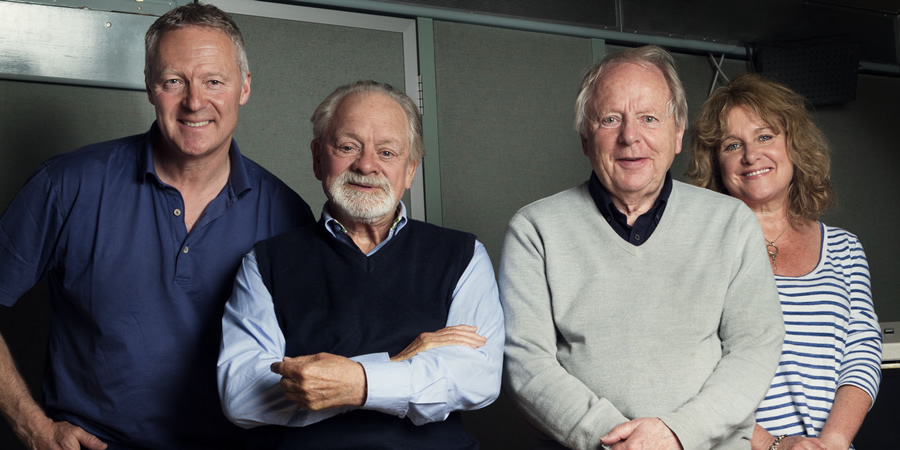
Yes, it was very much a case of coming full circle, at the end of my career. I first met David in the early 70s, in the aforementioned Next Programme, and Week Ending. Over the years our paths continued to keep crossing and we became good friends. In the mid-nineties we worked on a film for Yorkshire TV, which was based on an idea of his where he would have played this down-and-out character who's befriended by a cartoon creature called Lucky. Like a kind of Harvey, but you actually see and hear him.
David had done a lot of work with Cosgrove Hall, voicing Danger Mouse and so on, and they were going to take care of the animation. That one went backwards and forwards for a few years, with various script drafts and a lot of nice meetings at country hotels, and ... guess what, never made it to the screen. It had a lovely fairy tale quality and I think would have made quite a nice Christmas special. But even with David's bankability it wasn't to be.
A few years ago he suggested we make another sketch series together for radio, as he always loved nothing better than the chance to play lots of different characters. I already felt pretty much written out by that point, but came up with the idea of a Desert Island Discs pastiche, with a different fictional celebrity each week invited to choose some comedy sketches that would cheer them up as the only survivor in a post-apocalyptic world.
John Bird played the interviewer J.P.Doom, with David as the subject, and doubling up in a lot of the sketches. And we were truly blessed to get Rory Bremner, and Jan Ravens, who has got to be the most brilliant sketch performer in the country, she can do anything. So that was all very weird and mad, but worked quite well I think. It went out in 2016 in the old Week Ending slot at 11 o'clock where I imagine no one would have heard it, but did get a re-run this year, on Sundays just after The Archers. And I believe it's still hanging in on BBC Sounds for anyone who wants to check it out.
Help us publish more great content by becoming a BCG Supporter. You'll be backing our mission to champion, celebrate and promote British comedy in all its forms: past, present and future.
We understand times are tough, but if you believe in the power of laughter we'd be honoured to have you join us. Advertising doesn't cover our costs, so every single donation matters and is put to good use. Thank you.
Love comedy? Find out more
